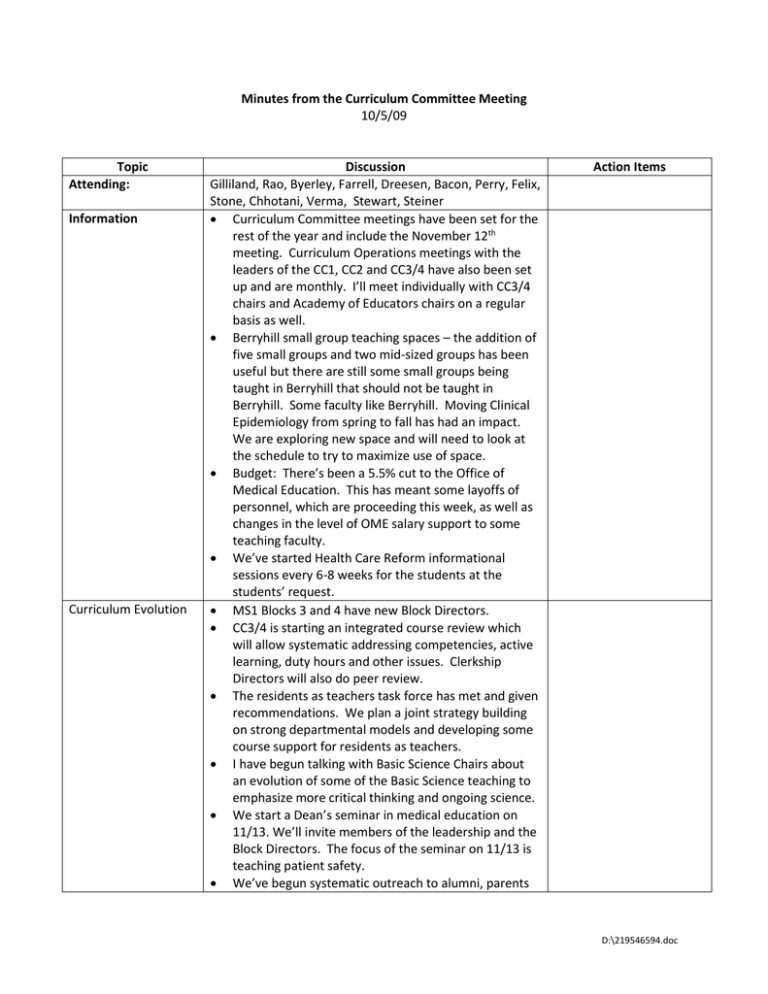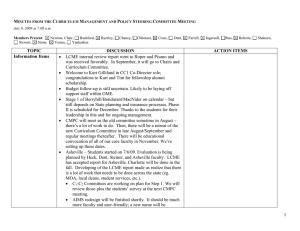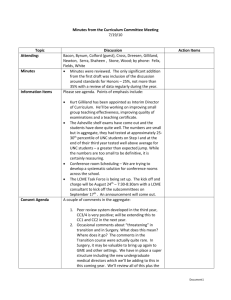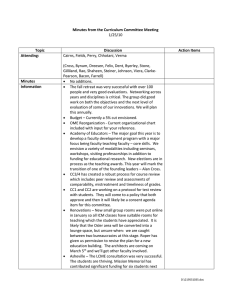10/5/09 Gilliland, Rao, Byerley, Farrell, Dreesen, Bacon, Perry, Felix,
advertisement

Minutes from the Curriculum Committee Meeting 10/5/09 Topic Attending: Information Curriculum Evolution Discussion Gilliland, Rao, Byerley, Farrell, Dreesen, Bacon, Perry, Felix, Stone, Chhotani, Verma, Stewart, Steiner Curriculum Committee meetings have been set for the rest of the year and include the November 12th meeting. Curriculum Operations meetings with the leaders of the CC1, CC2 and CC3/4 have also been set up and are monthly. I’ll meet individually with CC3/4 chairs and Academy of Educators chairs on a regular basis as well. Berryhill small group teaching spaces – the addition of five small groups and two mid-sized groups has been useful but there are still some small groups being taught in Berryhill that should not be taught in Berryhill. Some faculty like Berryhill. Moving Clinical Epidemiology from spring to fall has had an impact. We are exploring new space and will need to look at the schedule to try to maximize use of space. Budget: There’s been a 5.5% cut to the Office of Medical Education. This has meant some layoffs of personnel, which are proceeding this week, as well as changes in the level of OME salary support to some teaching faculty. We’ve started Health Care Reform informational sessions every 6-8 weeks for the students at the students’ request. MS1 Blocks 3 and 4 have new Block Directors. CC3/4 is starting an integrated course review which will allow systematic addressing competencies, active learning, duty hours and other issues. Clerkship Directors will also do peer review. The residents as teachers task force has met and given recommendations. We plan a joint strategy building on strong departmental models and developing some course support for residents as teachers. I have begun talking with Basic Science Chairs about an evolution of some of the Basic Science teaching to emphasize more critical thinking and ongoing science. We start a Dean’s seminar in medical education on 11/13. We’ll invite members of the leadership and the Block Directors. The focus of the seminar on 11/13 is teaching patient safety. We’ve begun systematic outreach to alumni, parents Action Items D:\219546594.doc LCME Clinical Skills in ICM ICM Task Force and the Council on Faculty Excellence on campus in addition to the internal work with the Basic Science and Clinical Chairs. We’ve developed an Excel spreadsheet with each of the 44 possible citations. We will track who’s responsible for what. Lisa Slatt will manage that and will be involved in each of the Curriculum Committees. Context: With respect to CPX, 45 out of 143 failed, essentially the same test as previously. The failures are all in the history and physical exam and assessment. A discussion at CC3/4 raised a number of possible hypotheses, including ICM teaching, clinical clerkship experience, quality of exam. With respect to ICM, Newton proposes a task force to look at the fundamental design of the course. ICM is a large and complex course that has had challenges over the years and great variability in quality. The task force would address goals and objectives for ICM, whether ICM should continue as one course or be split into components, how should the community experience be changed and give recommendations for improving clinical skills training. Newton asked for advice regarding process. Ana Felix speaking as a member of the leadership of ICM welcomes the review. She said that we’re at the stage that it would be useful. They added a lot of enhancements in the last year and learned a lot about how best to teach this. One of the features of many CPX failures was examining over gowns – this had been a major focus of the teaching over the last couple of years and they had made the decision to emphasize it. Of note, they’ve had success with hand washing! The variability of the community experience is striking. Some are phenomenal experiences and others are quite weak. This raises an issue of comparability that is important. Getting at the goals would be very valuable. What’s the role of simulated patients? Students tire of simulated patients - although National Medical Boards now include simulated patients, so they are going to have to get used to them. Improving clinical skills training is one of the overarching themes – important to integrate ICM and to understand the clinical clerkships can’t do Newton will call a task force to meet once and sort out causes and initial solutions and will report back. Newton will also empanel ICM review to report back to this Curriculum Committee. The understanding is that potentially major changes may be merited. D:\219546594.doc Setting Competencies for the School Looking at Long Term Outcomes everything. Newton briefly described the current UNC list of competencies and Duke set of competencies. The Mapping Committee (Longitudinal Clinical Skills Faculty) had looked at competencies from a variety of medical schools and decided that this was the best model. Comments included: The Duke set of competencies is robust. The value of this will be to help course directors know where they fit and what they have to do. At least from a genetics point of view, an attraction of the Duke system is that it allows addressing competencies across a number of different areas, not just medical knowledge. Level of detail feels actionable. Ultimately, we’re going to need to measure and assess whether or not we’ve achieved these competencies. Who are the customers of this? Clearly, the course directors will know where they fit in but also the students whom we can tell (for example) on the first day of class what we want them to do by the end. The Duke system is much more nuanced than current UNC. There are 12 categories to begin with as opposed to 3 and it’s more detailed at the next level. The Appendices (procedures, signs and symptoms, core diseases) are key. They represent a nice consensus and interestingly are simpler than what we came up with for Asheville. It will be important to get course director input on specifics – indeed, this needs to be something that the faculty as a whole owns. We need to make sure that USMLE estimates of what’s necessary in each course are consistent with these. Likewise, with the GQ elements. Of note, people with experience at Duke report that there’s been at least in their department no faculty involvement in the document after it was produced. We need to think about how to make this document and this process living. A key issue is keeping it simple and workable. One of the lessons that we’ve learned from Asheville is that we can be too complex and the cost of measurement becomes great. The list that we began to develop at our kick off retreat was a start but clearly there is more that needs Newton requests feedback within a week, particularly about overall categories, anything missing, anything that can be grouped, anything that can be deleted. CC1 and CC2 leaders should consider addressing USMLE requirements for Basic Science. CC3/4 leaders should particularly look at the Appendices and see whether the procedures and disease lists seem appropriate – what they would add and what they would subtract. Newton will take the next draft and reframe as a draft of the UNC set of core competencies. Newton will circulate Appendices A & B D:\219546594.doc to be added. Organization of Retreat Comments: One person identified an identity crisis – are we training generalists or researching subspecialists? One of the ways out of this has been to think about it from the point of view of bimodal products. We need leaders and leadership to be reflected in our long-term outcomes, understanding that it needs to be defined broadly - it’s leadership in communities or in professional associations or whatever. Looking through the “what we are doing when we are doing our best” list, it’s clear that values are critical. We need to make sure that these long-term outcomes deal with values as well. Newton described possible strands: 1) the core competencies and the further definition with perhaps groups looking at them, 2) vertical integration with priorities chosen from last year – Neuroscience, Evidence Based Medicine, Clinical Skills, Pediatrics & Embryology. electronically and request feedback and comments about what our long-term outcomes should be. He’ll then take this document and develop it further, putting in parallel to the core competencies and get feedback. Other Comments & Suggestions: GQ We need some place to talk as a group about our achievements in the last year in addition to the things that we need to do better. What about Asheville? What are we learning from Asheville? Small groups can have input on the documents. Comparability would be good to address, given that we are beginning to look at that across clerkships. Who will attend? Include course directors, advisors, representatives of key programs. Consider including some residents, community preceptors and small group teachers. Another good question is the impact of first year curriculum reorganization. What about cultural competency? What does that mean? How well are we doing from it? Should this be another track that we look at? Academy of Educators has indicated that they’d like to have some input onto topics for faculty development. What should we focus on from GQ? Varied opinion. Look at only those things that this source of data will be helpful to us (e.g., mistreatment because GQ is Newton will draft a “straw man” proposal ASAP and submit it to the committee for their input. Newton will work with leadership of ICM, Humanities, core clerkships with outpatient preceptors and AHEC Directors to identify preceptors for their interest and involvement and submit an invitation to them as soon as possible. Subsequently, we’ll find a way to make this Curriculum D:\219546594.doc anonymous). GQ is one of the benchmarks for the LCME review. We need to be aware of it, although we haven’t been reviewing it regularly. It probably should not go to all faculty, rather, it should be summarized in some way. Note that there are parts of the GQ that are important but not necessarily directly relevant to curriculum – Student Affairs and the like. More people than this committee need to know it exists. Committee aware of the GQ and perhaps some key elements of it and to summarize to the core teaching faculty, perhaps at the fall retreat. D:\219546594.doc


